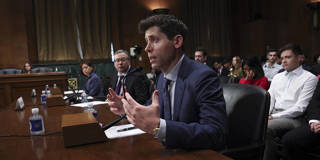Major advances in AI are raising a raft of concerns about education, work, warfare, and other risks that could destabilize human civilization long before climate change does. While policy responses are urgently needed, they also must be guided by the right principles.
ITHACA, NEW YORK – Technology is changing the world faster than policymakers can devise new ways to cope with it. As a result, societies are becoming polarized, inequality is rising, and authoritarian regimes and corporations are doctoring reality and undermining democracy.
For ordinary people, there is ample reason to be “a little bit scared,” as OpenAI CEO Sam Altman recently put it. Major advances in artificial intelligence raise concerns about education, work, warfare, and other risks that could destabilize civilization long before climate change does. To his credit, Altman is urging lawmakers to regulate his industry.
In confronting this challenge, we must keep two concerns in mind. The first is the need for speed. If we take too long, we may find ourselves closing the barn door after the horse has bolted. That is what happened with the 1968 Nuclear Non-Proliferation Treaty: It came 23 years too late. If we had managed to establish some minimal rules after World War II, the NPT’s ultimate goal of nuclear disarmament might have been achievable.

ITHACA, NEW YORK – Technology is changing the world faster than policymakers can devise new ways to cope with it. As a result, societies are becoming polarized, inequality is rising, and authoritarian regimes and corporations are doctoring reality and undermining democracy.
For ordinary people, there is ample reason to be “a little bit scared,” as OpenAI CEO Sam Altman recently put it. Major advances in artificial intelligence raise concerns about education, work, warfare, and other risks that could destabilize civilization long before climate change does. To his credit, Altman is urging lawmakers to regulate his industry.
In confronting this challenge, we must keep two concerns in mind. The first is the need for speed. If we take too long, we may find ourselves closing the barn door after the horse has bolted. That is what happened with the 1968 Nuclear Non-Proliferation Treaty: It came 23 years too late. If we had managed to establish some minimal rules after World War II, the NPT’s ultimate goal of nuclear disarmament might have been achievable.